 MyCatBreeds
MyCatBreeds European Shorthair is originated from Sweden but British Semi-Longhair is originated from United Kingdom. Both European Shorthair and British Semi-Longhair are having almost same weight. European Shorthair may live 4 years more than British Semi-Longhair. Both European Shorthair and British Semi-Longhair has same litter size. European Shorthair requires Low maintenance. But British Semi-Longhair requires Moderate maintenance
European Shorthair is originated from Sweden but British Semi-Longhair is originated from United Kingdom. Both European Shorthair and British Semi-Longhair are having almost same weight. European Shorthair may live 4 years more than British Semi-Longhair. Both European Shorthair and British Semi-Longhair has same litter size. European Shorthair requires Low maintenance. But British Semi-Longhair requires Moderate maintenance
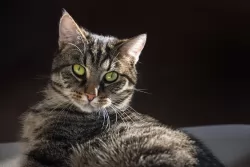 The European Shorthair is a cat breed that hails from Sweden but it also has roots that go back to the Roman Empire.
The European Shorthair is a cat breed that hails from Sweden but it also has roots that go back to the Roman Empire.
It is referred to as a natural cat breed, which means that the cat came about naturally without any human intervention.
The cat has had great hunting skills and this has what has made it sought after as a cat to keep rodents at bay. It became a famous housecat as well.
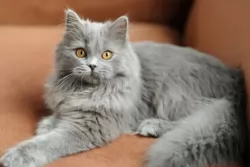 The British semi-Longhair cat is exactly like the British Shorthair except when it comes to the coat length - the hair is longer.
The British semi-Longhair cat is exactly like the British Shorthair except when it comes to the coat length - the hair is longer.
During the 20th century, a short-haired version of the modern Persian was developed and it was then proposed that a long-haired cat of the British type make it into the cat fancy.
The British Shorthair cat was bred with different Persian cat breeds which then resulted in a cat that looked like the British Shorthair cat, just with longer hair. It is recognized separately in the United States of America but considered one and the same as the short hair in the United Kingdom.
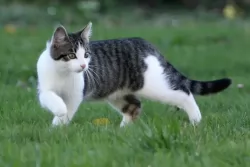 These domestic cats of Europe are a medium- to large-sized cat, weighing between 4 and 6kg, though some can be heavier.
These domestic cats of Europe are a medium- to large-sized cat, weighing between 4 and 6kg, though some can be heavier.
The European Shorthair has a fairly large head and medium-sized ears. The body is robust and round shaped. The cat’s short coat without an undercoat comes in a range of colors and patterns such as white, cream, red, black and blue with eyes that are green, yellow, brown or copper or blue.
The European Shorthair is known for its adaptable nature and the cat is able to fit into different lifestyles with ease. It's a cat that will live happily with children, pets, adults and seniors.
The cat loves his human family and loves becoming involved with fun games and activities. It's an intelligent cat too and cat food puzzles help him to think about how to get his food.
Even though your cat is social with his human family, it becomes fairly shy and nervous of strangers.
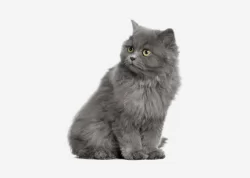 The British Semi-longhair can become quite a large cat really and is described as a medium to large cat. In fact, a full-grown British Semi-Longhair can grow to be about 7.5kg in weight.
The British Semi-longhair can become quite a large cat really and is described as a medium to large cat. In fact, a full-grown British Semi-Longhair can grow to be about 7.5kg in weight.
They’re compact and robust with short, strong legs. The longish coat can be in all colors and patterns and he sheds moderately. Color can be white, cream, chocolate, blue and colors can be solid, ticked or bi-colored.
The ears are wide-spaced and medium-sized and they eyes are almond-shaped and match the color of its coat.
The British Semi-Longhair cat is such an easy-going pussycat while being reserved, independent and undemanding. He will get on with children and other pets in the home. Perhaps he suits someone who loves the idea of having a gorgeous pet around, but who is working and doesn’t have that amount of time to devote to a cat.
The British semi-longhair is one of those cats that doesn’t mind too much if you disappear to work each day. He can amuse himself without you during that time, as long as he has some nice toys and a nice environment to chill.
It’s not the kind of cat to follow you around, making it perfect for anyone who doesn’t have the time to give the cat too much attention. It’s simply not a lap-cat.
The cat isn’t very active at all and is more than happy to sit in his favorite spot in the sun and to watch activities from there. This is a quiet, content cat, not wanting to meow unnecessarily and his round face shows off a happy disposition.
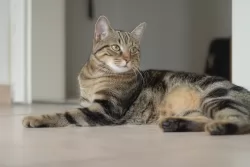 The European Shorthair is such a sweet cat and he is able to adapt fairly easily to new environments. It is such an ideal cat for households with singles, couples, families, and seniors as it adapts its personality to suit, getting on well with other pets as well.
The European Shorthair is such a sweet cat and he is able to adapt fairly easily to new environments. It is such an ideal cat for households with singles, couples, families, and seniors as it adapts its personality to suit, getting on well with other pets as well.
The cat loves his human family and wants to please, but loves to play too, being active and playful. Having one of these cats in your home is like bringing in a treasured gem.
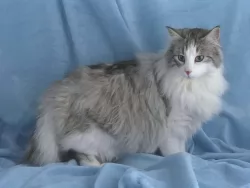 This moderately shedding cat is such a balanced cat – it is good with everyone, is quiet and unassuming. It just quietly gets on with life, being content and satisfied with its lot.
This moderately shedding cat is such a balanced cat – it is good with everyone, is quiet and unassuming. It just quietly gets on with life, being content and satisfied with its lot.
If you’re looking for a more ‘involved’, vocal, active cat, the British semi-longhair isn’t for you. If you however, want a quiet, steady presence in your home, this lovely cat is for you.
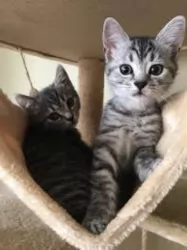 Even if your European Shorthair appears to be well, it is a good idea to get used to taking your cat to the vet for an annual check-up.
Even if your European Shorthair appears to be well, it is a good idea to get used to taking your cat to the vet for an annual check-up.
To provide your cat with the best chance to remain healthy, good diet and exercise is imperative. Look out for an itchy skin too as this could well be a sign that your cat is being plagued by parasites. Parasites can be a terrible problem and it will need to be attended to by your vet.
Parasites and an itchy skin can be a nightmare for your pet and make him most miserable with excessive scratching and licking as well as thinning of hair.
A new kitten will also require being vaccinated to ensure he remains healthy. These injections protect your cat from life-threatening diseases. Usually, vets start vaccines at between 8 – 12 weeks of age to protect your cat against the likes of Feline Leukaemia Virus, Feline Infectious Enteritis and Cat Flu.
There are also other vaccinations you might want to consider such as rabies and chlamydia.
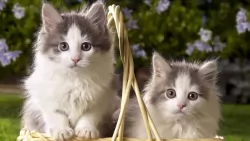 Your British semi-longhair is quite healthy, but it does come with a few issues, and this is suffering with renal and kidney diseases – more so than with other cat breeds.
Your British semi-longhair is quite healthy, but it does come with a few issues, and this is suffering with renal and kidney diseases – more so than with other cat breeds.
It can also battle with hypertrophic cardiomyopathy, a type of heart disease often found in cats.
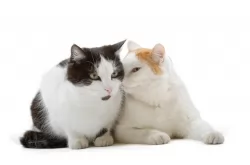 European Shorthairs like to groom themselves, but even so, you want to brush your cat once a week to keep the hair shiny and healthy. Make sure to trim your cat’s claws at the same time. It’s your time to feel for any unusual lumps or scratches on your feline friend’s skin. Check his eyes and make sure they are still bright and clear, look inside the ears to make sure they aren’t becoming clogged with dirt and wax and look inside the mouth to ensure no signs of gum- and tooth disease.
European Shorthairs like to groom themselves, but even so, you want to brush your cat once a week to keep the hair shiny and healthy. Make sure to trim your cat’s claws at the same time. It’s your time to feel for any unusual lumps or scratches on your feline friend’s skin. Check his eyes and make sure they are still bright and clear, look inside the ears to make sure they aren’t becoming clogged with dirt and wax and look inside the mouth to ensure no signs of gum- and tooth disease.
Your cat may well be outgoing with his human family, but his nervousness with strangers will require you providing him with a safe haven of his own. This might be his own bed which should be in a safe, dry, quiet area where he can retreat and feel more secure.
European Shorthairs love being outdoors and particularly if you have a female you’ll want her spayed to avoid her becoming pregnant. Cat shelters are already full of unwanted kittens and you don’t want to add to the burden. Also, have your male neutered too as he is ar less likely to want to roam. Spaying and neutering come with many health benefits too.
Be very careful of your cat’s diet. This is because the domestic cat is a carnivore and still essentially a predator, liking to hunt for their meat. They require a meat diet. However, cats have special dietary requirements and they require a balanced diet. All cats are individuals and they have different food likes and preferences, but they all need the best food there is to remain in peak condition. If you feed your cat commercially manufactured food, always follow the instructions on the label.
Provide your feline pet with cat accessories – food and water bowl, collar and tag, soft bedding, a climbing tree, scratching post, litter box, grooming accessories and toys.
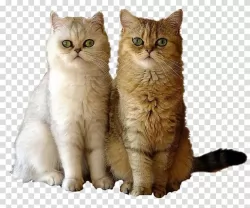 Because of the semi-longhair, the British Semi-Longhair will require more effort than short hair cats with keeping the coat free of tangling. It’s a good idea to get this cat used to a brush-session to free the coat of dust and loose hairs at least once or twice a week.
Because of the semi-longhair, the British Semi-Longhair will require more effort than short hair cats with keeping the coat free of tangling. It’s a good idea to get this cat used to a brush-session to free the coat of dust and loose hairs at least once or twice a week.
Other basic grooming requirements for your kitty kat would be to keep the claws short, to check inside the mouth for dental problems, to check inside the ears for dirt and redness and to check the eyes to make sure they’re bright and clear. If there is a discharge, wipe the eyes gently with warm water and some apple cider vinegar. Be very gentle with all your grooming processes for your cat.
The British semi-Longhair enjoys his food and if you don’t feed him in a responsible manner he can become obese. He is such a beautiful cat this that you want to ensure he gets the best premium quality food there is – food that is high in proteins.
It’s not worth feeding your beautiful semi-longhair on inferior foods as this can impair his health.
Cats are carnivores – related to lions – they’re meat-eaters. As far as their diet is concerned, they need fats and proteins and not carbs.
When you’re choosing food for your British semi-Longhair, check out the label to make sure you know precisely what your cat is taking in. When you are 100% sure that the food is the best it can be and your cat loves it, give it to him.
Don’t change foods haphazardly, as this cat likes a lifestyle devoid of sudden changes. If in any doubt, get advice from your vet on weight and calorie intake for your pet.